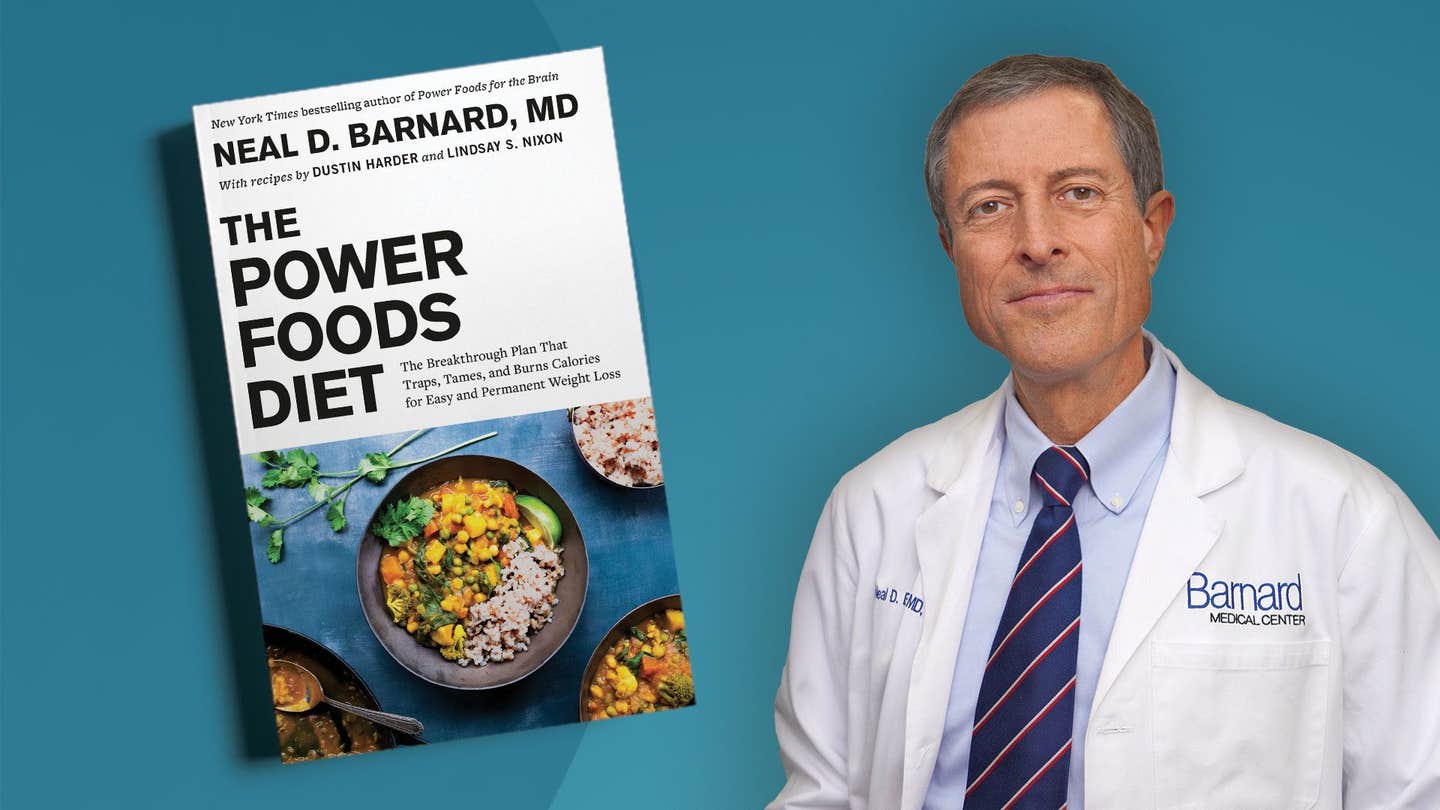
What Is the Power Foods Diet? Dr. Neal Barnard Shares Lessons From His New Book
Americans spend $70 billion on weight-loss programs, drugs, and other diet aids every year, but what if we could lose unwanted weight and get healthy simply by eating more of the things we already enjoy, like apples, beans, and oatmeal? That’s the proposition Neal Barnard, M.D., FACC, makes in his new book, The Power Foods Diet. Leaning heavily into the science, Barnard—the founder of Physicians Committee for Responsible Medicine—lays out the case for eliminating fat-laden foods and increasing our intake of fiber-rich whole plant foods to drop pounds and regain our health without feeling deprived. “Certain foods make weight loss easy,” says Barnard, whose research team at the Physicians Committee has published numerous peer-reviewed studies on nutrition and health, including one published in 2022 in the Journal of the American Nutrition Association showing a low-fat vegan diet to be far more effective than a Mediterranean diet for weight loss.
As the book succinctly illustrates, many fruits, whole grains, legumes, and spices contain metabolic boosters and natural compounds that can usher fat out of our systems, make us feel sated, and even lower our blood pressure, without the common side effects of prescription diet medications. With more than 120 recipes, The Power Foods Diet is part cookbook, part how-to guide for healthy eating. We spoke with Barnard to learn more about how small dietary shifts can support our health, how to eat healthfully while enjoying an indulgent meal at your favorite restaurant, and more lessons from the new book.
The Power Foods Diet proposes a 21-day “immersion” centered on foods that support weight loss. What are some of the changes one might expect in those initial three weeks?
Neal Barnard, M.D., FACC: The first is physical. You'll start to lose weight, and the weight loss usually begins on Day 1. It can be modest at first, but you'll see it is happening. But the beauty of it is that it's happening without ramping up exercise, without limiting calories. People with digestive issues, they're often getting dramatically better. And people feel mentally clearer quite often. And that's because [the] blood is less viscous, and so the brain oxygenates better. If you continue, you'll discover lots of other things, like migraines that are less frequent, and menstrual periods are less intense.
Readers might be surprised to read that it’s possible to achieve Ozempic-like weight loss results merely by eating the right foods. What can you tell us about the appetite-suppressing compound GLP-1?
NB: GLP-1 is a natural substance made by your intestinal tract, and it's an appetite signal. How does your body know that you've eaten enough and that you should stop? Part of it is that your stomach expands and you might feel full, but [another part is that] when food goes down your digestive tract, it releases GLP-1. The GLP-1 turns off your appetite. The drug manufacturer sells what they would call an “analog” or an “agonist” of GLP-1, called Ozempic, also marketed as Wegovy. It has various side effects, but your body will make GLP-1 naturally.
Another thing readers might be interested to discover is that carbs are not the enemy of our weight-loss intentions. How did so many of us come to believe that they are?
NB: I'm going to blame Robert Atkins, who was a well-meaning, but maybe not the best-informed person. He said if you stop eating carbohydrates, you'll lose weight. True, because carbohydrate is 50 or 60% of what everybody eats. And he [popularized] the idea that carbohydrates were bad for you. However, biochemists have always been skeptical of this because carbohydrate just means starch. It has only four calories in a gram, but fats have nine calories in a gram. So they started to suspect—and it turned out to be true—that what is fattening about bread is that when it comes out of a toaster, you smear it with butter. In the same way as when the potato comes out of the oven, we put on butter and sour cream and cheese and bacon bits. The fatty toppings were always the issue.
French Toast with Cinnamon Blueberry Syrup from The Power Foods Diet
Besides recipes, the book also includes food-prepping tips to make healthy eating easier. What's your personal favorite tip?
NB: Think big. When you shop, buy extra. When you cook, cook extra. That way, you will have what you need now, and will be set for tomorrow and the next day, too. You will also be ready when family members dig in a bit more than expected. If you think big, you’ll never end up with empty shelves. That’s important because empty shelves—and the inevitable trips to convenience stores—are one of the biggest reasons people stray from a healthful diet.
The book suggests that we can still eat out at restaurants while trying to shed some pounds. What are some of the dishes we can enjoy that won’t interfere with our weight loss goals?
NB: Think international. So when you’re going to your favorite Italian place: minestrone, pasta e fagioli, all fine. When your angel hair pasta comes, top it with the arrabiata sauce. Chinese restaurants: rice dishes, tofu dishes, vegetable dishes, soups. Japanese: Have the cucumber roll, the asparagus roll, the sweet potato roll, the miso soup, the edamame. Mexican: Veggie fajitas, bean burritos, beans and rice.
You propose enlisting a friend or family member to join in this new way of eating. How might that help?
NB: You can do it by yourself, but our friends and family are the people we eat with. They're the people who support us, and they're also the people who are going to get in our way. If you have a family member who's smoking and you're smoking, it's harder to quit than if they decide to quit with you. If you're improving your diet and somebody says, “Let's do that together,” that's great. You could share the shopping, the cooking, and the credit when other people in the household say, "Wow, your Southwest chili was great!" or "Your wild blueberry muffins were fantastic!"
Barnard’s new book, The Power Foods Diet, will be released March 26, 2024, and is available for preorder now.
Forks Over Knives may collect a small share of sales from some of the links on this page, though it doesn’t influence our product picks.

About the Author

About the Author
Aurelia d’Andrea
Join our mailing list
Get free recipes and the latest info on living a happy, healthy plant-based lifestyle.
By providing your email address, you consent to receive newsletter emails from Forks Over Knives. We value your privacy and will keep your email address safe. You may unsubscribe from our emails at any time.